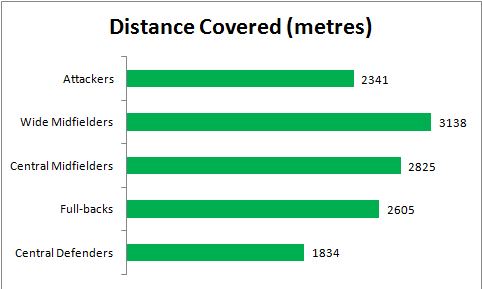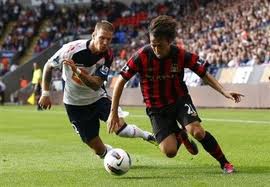Main Menu
Latest Blog Entry
User login
Are you fit enough to play in the Champions League Final?
Only the fittest will prevail.
As the world’s top footballers prepare to meet in the Champions League Final this weekend, we explore what it takes to make it at the highest level.
Advances in Sports Science have revealed the highly energetic demands within the modern game, what we as coaches then do is help you get ready to play and meet those demands.
What is football fitness?
Modern footballers run about 10km within a 90 minute game. One Champions League Final saw Barcelona’s Xavi cover a distance of 11.95km.
Due to the length of a football match, roughly 90% of energy release is aerobic (3), with the average oxygen uptake (VO2) for elite footballers measuring roughly 70% of maximum (1).
However in addition to sustaining effort for the full duration of a game, the ability to repeatedly produce rapid short bursts is vitally important.
Being able to run at speed and change direction quickly in order to beat an opponent to the ball or evade a tackle will give a player a significant advantage.
Top class players perform between 150-250 brief intense actions during a game, accounting for roughly 30% of activities within a game (1). The distance covered during high intensity efforts varies by position (2) and is shown below.
How can I get fit for football?
It is clear that footballers need the ability to work at high speed, to repeat the high speed activities regularly throughout a game and to continuously work at low intensity in between efforts. So how do you train all of these components together?
 Before trying to increase the quantity of high intensity work in training, it is first necessary to train the quality of speed.
Before trying to increase the quantity of high intensity work in training, it is first necessary to train the quality of speed.
This will involve training straight line speed to improve the ability to run faster as well as agility to change direction at speed.
Changing direction is a very energy consuming movement, and the ability to do so efficiently will save energy which can be utilised later on.
Once the foundation of quality has been set, the quantity of high intensity work can be increased to improve speed endurance. Exercises such as shuttle runs and repeated sprints can be used to train speed endurance. However to more accurately mirror the demands of the game, football specific drills can be utilised.
(We are currently working with 3 members of the England team preparing for the Paralympics. Their game is different, but we use the same principles to help them get fit for intense competition).
Conclusion
To maximise the effectiveness of these training strategies, speed and speed endurance work should be done regularly and when the players are not fatigued.
Devote 10-15 minutes at the start of technical/tactical training sessions to speed and speed endurance work: this allows quality to be developed.
The lower intensity work can follow this and will provide the base for the continuous work capacity needed to sustain effort for the duration of a game.
This allows players to practice skills in a fatigued state, preparing them for a game situation. It is also important to monitor fitness through testing.
If you want to get fit for football without getting injured, then why not start now with our Sports Training System?
Matt Durber
References
1) Bangsbo, J., Mohr, M. & Krustrup, P. (2006) Physical and metabolic demands of training and match-play in the elite football player, Journal of Sports Sciences, 24 (7), 665-674.
2) Bradley, P.S., Sheldon, W., Wooster, B., Olsen, P., Boanas, P. & Krustrup, P. (2009) High-intensity running in English F.A. Premier League soccer matches, Journal of Sports Sciences, 27 (2), 159-168.
3) Hoff, J., Wisloff, U., Engen, L.C., Kemi, O.J. & Helgerud, J. (2002) Soccer
specific aerobic endurance training, British Journal of Sports Medicine, 36, 218-221.
Client Testimonials
 University of Exeter
University of Exeter
James has been our lead strength and conditioning coach for the Talented Athlete Scholarship Scheme (TASS) at the University of Exeter since the scheme's inception. His attitude, professionalism and above all his drive and desire to help each sportsman and woman develop and reach their potential is exactly what we require. James shows a real interest in each of his athletes and helps them to aspire to be as good as they can and ensures that no goals are unattainable.
More


Comments
[…] Are you fit enough to play in the Champions League Final? The complete low down on the fitness demands of playing top level football by Matt Durber. […]
[…] are compared to other sports performers, they are not particularly superior in one specific area of fitness – apart from the anaerobic […]